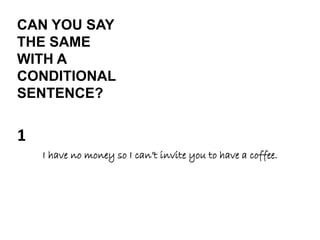Conditional sentences types II, III transformation
•Download as PPSX, PDF•
1 like•2,178 views
If I had some money, I could invite you to have a coffee. The document discusses using conditional sentences to rephrase statements involving conditions. It provides an example of rephrasing "I have no money so I can't invite you to have a coffee" as a Type II conditional "If I had some money, I could invite you to have a coffee."
Report
Share
Report
Share

Recommended
Recommended
More Related Content
What's hot
What's hot (18)
Similar to Conditional sentences types II, III transformation
Similar to Conditional sentences types II, III transformation (7)
Grammar - Condiitonals (zero, first, second, and third conditionals)

Grammar - Condiitonals (zero, first, second, and third conditionals)
Recently uploaded
https://app.box.com/s/4hfk1xwgxnova7f4dm37birdzflj806wGIÁO ÁN DẠY THÊM (KẾ HOẠCH BÀI BUỔI 2) - TIẾNG ANH 8 GLOBAL SUCCESS (2 CỘT) N...

GIÁO ÁN DẠY THÊM (KẾ HOẠCH BÀI BUỔI 2) - TIẾNG ANH 8 GLOBAL SUCCESS (2 CỘT) N...Nguyen Thanh Tu Collection
Recently uploaded (20)
Benefits and Challenges of Using Open Educational Resources

Benefits and Challenges of Using Open Educational Resources
slides CapTechTalks Webinar May 2024 Alexander Perry.pptx

slides CapTechTalks Webinar May 2024 Alexander Perry.pptx
Danh sách HSG Bộ môn cấp trường - Cấp THPT.pdf

Danh sách HSG Bộ môn cấp trường - Cấp THPT.pdf
Jose-Rizal-and-Philippine-Nationalism-National-Symbol-2.pptx

Jose-Rizal-and-Philippine-Nationalism-National-Symbol-2.pptx
Application of Matrices in real life. Presentation on application of matrices

Application of Matrices in real life. Presentation on application of matrices
GIÁO ÁN DẠY THÊM (KẾ HOẠCH BÀI BUỔI 2) - TIẾNG ANH 8 GLOBAL SUCCESS (2 CỘT) N...

GIÁO ÁN DẠY THÊM (KẾ HOẠCH BÀI BUỔI 2) - TIẾNG ANH 8 GLOBAL SUCCESS (2 CỘT) N...
Basic Civil Engineering Notes of Chapter-6, Topic- Ecosystem, Biodiversity G...

Basic Civil Engineering Notes of Chapter-6, Topic- Ecosystem, Biodiversity G...
Industrial Training Report- AKTU Industrial Training Report

Industrial Training Report- AKTU Industrial Training Report
Students, digital devices and success - Andreas Schleicher - 27 May 2024..pptx

Students, digital devices and success - Andreas Schleicher - 27 May 2024..pptx
Conditional sentences types II, III transformation
- 1. I have no money so I can’t invite you to have a coffee. CAN YOU SAY THE SAME WITH A CONDITIONAL SENTENCE? 1
- 2. I have no money so I can’t invite you to have a coffee. PRESENT TENSE PRESENT TENSE IF clause MAIN clause TYPE 0 Present simple Present simple Imperative · scientific facts · always true/ valid TYPE I Present simple Future (WILL) · probable in the future TYPE II Past simple Would + infinitive · unreal/ hypothetcal present TYPE III Past perfect Would have + past participle · unreal past We are talking about a PRESENT SITUATION, which can be expressed using a conditional TYPE II. IMPORTANT: even if the conditional TYPE II is formed with the PAST SIMPLE, it talks about a hypothetical present situation, that’s why it’s used in this case.
- 3. I have no money so I can’t invite you to have a coffee. = If I had some money, I could invite you to have a coffee. Si tuviese dinero (ahora), podría invitarte (ahora) a tomar un café.
- 4. I hadn’t locked the door, so burglars broke into my house. 2 CAN YOU SAY THE SAME WITH A CONDITIONAL SENTENCE?
- 5. I hadn’t locked the door, so burglars broke into my house. PAST PERFECT PAST SIMPLE IF clause MAIN clause TYPE 0 Present simple Present simple Imperative · scientific facts · always true/ valid TYPE I Present simple Future (WILL) · probable in the future TYPE II Past simple Would + infinitive · unreal/ hypothetcal present TYPE III Past perfect Would have + past participle · unreal past We are talking about a PAST situation, which can be expressed using a conditional TYPE III. IMPORTANT: even if the conditional TYPE III is formed with the PAST PERFECT, we can use it to rephrase a situation expressed with the PAST SIMPLE.
- 6. I hadn’t locked the door, so burglars broke into my house. = If I had locked the door, burglars wouldn’t have broken into my house. Si hubiese cerrado la puerta con llave(aquel día pasado), los ladrones no habrían entrado (aquel día) en mi casa.
